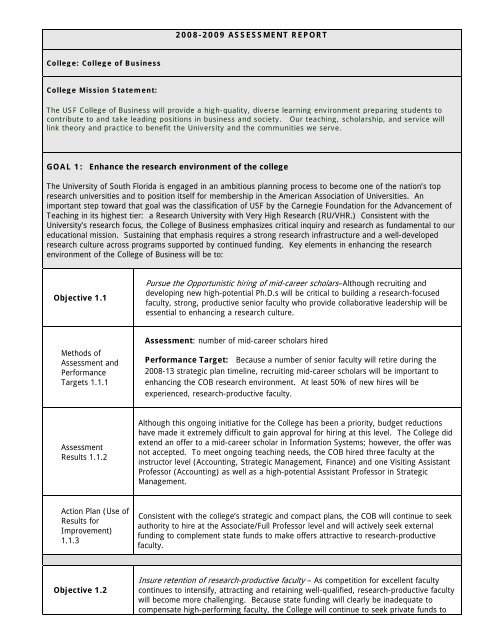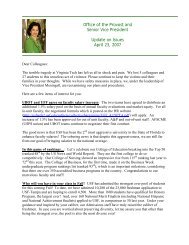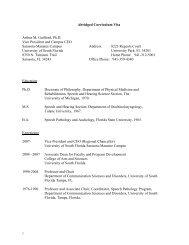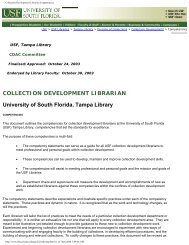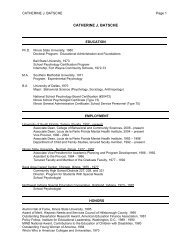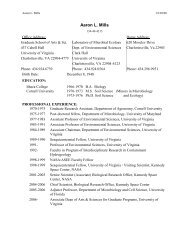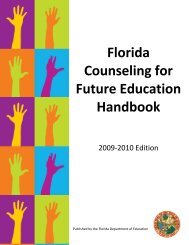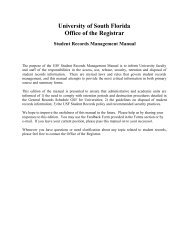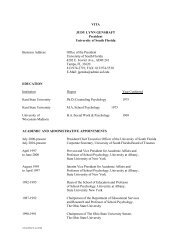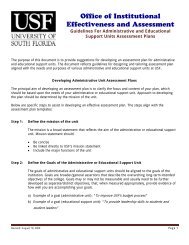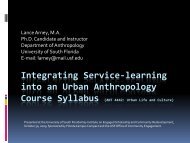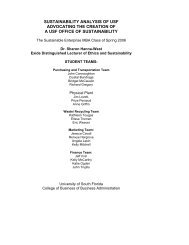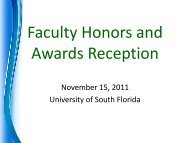SAMPLE ASSESSMENT PLAN TEMPLATE - Office of the Provost ...
SAMPLE ASSESSMENT PLAN TEMPLATE - Office of the Provost ...
SAMPLE ASSESSMENT PLAN TEMPLATE - Office of the Provost ...
Create successful ePaper yourself
Turn your PDF publications into a flip-book with our unique Google optimized e-Paper software.
2008-2009 <strong>ASSESSMENT</strong> REPORTCollege: College <strong>of</strong> BusinessCollege Mission Statement:The USF College <strong>of</strong> Business will provide a high-quality, diverse learning environment preparing students tocontribute to and take leading positions in business and society. Our teaching, scholarship, and service willlink <strong>the</strong>ory and practice to benefit <strong>the</strong> University and <strong>the</strong> communities we serve.GOAL 1: Enhance <strong>the</strong> research environment <strong>of</strong> <strong>the</strong> collegeThe University <strong>of</strong> South Florida is engaged in an ambitious planning process to become one <strong>of</strong> <strong>the</strong> nation’s topresearch universities and to position itself for membership in <strong>the</strong> American Association <strong>of</strong> Universities. Animportant step toward that goal was <strong>the</strong> classification <strong>of</strong> USF by <strong>the</strong> Carnegie Foundation for <strong>the</strong> Advancement <strong>of</strong>Teaching in its highest tier: a Research University with Very High Research (RU/VHR.) Consistent with <strong>the</strong>University’s research focus, <strong>the</strong> College <strong>of</strong> Business emphasizes critical inquiry and research as fundamental to oureducational mission. Sustaining that emphasis requires a strong research infrastructure and a well-developedresearch culture across programs supported by continued funding. Key elements in enhancing <strong>the</strong> researchenvironment <strong>of</strong> <strong>the</strong> College <strong>of</strong> Business will be to:Objective 1.1Pursue <strong>the</strong> Opportunistic hiring <strong>of</strong> mid-career scholars–Although recruiting anddeveloping new high-potential Ph.D.s will be critical to building a research-focusedfaculty, strong, productive senior faculty who provide collaborative leadership will beessential to enhancing a research culture.Methods <strong>of</strong>Assessment andPerformanceTargets 1.1.1Assessment: number <strong>of</strong> mid-career scholars hiredPerformance Target: Because a number <strong>of</strong> senior faculty will retire during <strong>the</strong>2008-13 strategic plan timeline, recruiting mid-career scholars will be important toenhancing <strong>the</strong> COB research environment. At least 50% <strong>of</strong> new hires will beexperienced, research-productive faculty.AssessmentResults 1.1.2Although this ongoing initiative for <strong>the</strong> College has been a priority, budget reductionshave made it extremely difficult to gain approval for hiring at this level. The College didextend an <strong>of</strong>fer to a mid-career scholar in Information Systems; however, <strong>the</strong> <strong>of</strong>fer wasnot accepted. To meet ongoing teaching needs, <strong>the</strong> COB hired three faculty at <strong>the</strong>instructor level (Accounting, Strategic Management, Finance) and one Visiting AssistantPr<strong>of</strong>essor (Accounting) as well as a high-potential Assistant Pr<strong>of</strong>essor in StrategicManagement.Action Plan (Use <strong>of</strong>Results forImprovement)1.1.3Consistent with <strong>the</strong> college’s strategic and compact plans, <strong>the</strong> COB will continue to seekauthority to hire at <strong>the</strong> Associate/Full Pr<strong>of</strong>essor level and will actively seek externalfunding to complement state funds to make <strong>of</strong>fers attractive to research-productivefaculty.Objective 1.2Insure retention <strong>of</strong> research-productive faculty – As competition for excellent facultycontinues to intensify, attracting and retaining well-qualified, research-productive facultywill become more challenging. Because state funding will clearly be inadequate tocompensate high-performing faculty, <strong>the</strong> College will continue to seek private funds to
<strong>the</strong> college will 1) develop a program to identify high-potential undergraduate studentson admission to <strong>the</strong> college and match <strong>the</strong>m with research faculty and 2) expand <strong>the</strong>strategic partnership between <strong>the</strong> Center for Entrepreneurship and <strong>the</strong> Honors College toencourage and support honors <strong>the</strong>ses with an entrepreneurial focus.Methods <strong>of</strong>Assessment andPerformanceTargets 1.4.1Assessment – Development <strong>of</strong> program; number <strong>of</strong> undergraduates matched withresearch faculty; number <strong>of</strong> honors <strong>the</strong>ses supervised by entrepreneurship facultyPerformance Target - Formalize both programs by fall semester 2009Assessment Results1.4.2Action Plan (use <strong>of</strong>Results forImprovement1.4.3The strategic partnership between <strong>the</strong> Honors College and <strong>the</strong> Center forEntrepreneurship is in place: <strong>the</strong> Center for Entrepreneurship delivered an integratedentrepreneurship curriculum tied to entrepreneurial honors <strong>the</strong>ses leading to 9completed projects for 2008-9. The Undergraduate Program Committee did not address<strong>the</strong> program to match high-potential undergraduates during <strong>the</strong> 2008-9 academic yearbut is expected to do so in fall 2009.Continue to expand <strong>the</strong> partnership with <strong>the</strong> Honors College; develop <strong>the</strong> faculty matchprogram during academic 2009-10.Objective 1.5Promote interdisciplinary collaboration in research – Encourage collaboration acrossdisciplines and colleges; develop private funds to support interdisciplinary seminars andvisiting scholars.Methods <strong>of</strong>Assessment andPerformanceTargets 1.5.1Assessment – number <strong>of</strong> visiting scholars addressing topics <strong>of</strong> cross-disciplinaryinterestsPerformance Target – Two visiting scholars per academic yearAssessment Results1.5.2Action Plan (use <strong>of</strong>Results forImprovement1.5.3Bill Starbuck (Pr<strong>of</strong>essor Emeritus, Stern/NYU) visited for six weeks, providing a series <strong>of</strong>research workshops and seminars; Nobel Laureate in Economics Vernon Smith provideda series <strong>of</strong> lectures for faculty, students, and members <strong>of</strong> <strong>the</strong> business communitySeek additional private funds to maintain <strong>the</strong> programGOAL 2: Promote Excellence in Graduate & Undergraduate ProgramsEnhance <strong>the</strong> skills and performance <strong>of</strong> College <strong>of</strong> Business graduates at all levels to insure <strong>the</strong>y will be <strong>the</strong> firstchoice <strong>of</strong> employers and graduate schools in our target markets. The success <strong>of</strong> our graduates is <strong>the</strong> ultimatemeasure <strong>of</strong> <strong>the</strong> strength and effectiveness <strong>of</strong> our undergraduate and graduate programs. As part <strong>of</strong> ourcontinuous improvement efforts, <strong>the</strong> College has committed to:Objective 2.1Expansion <strong>of</strong> <strong>the</strong> Communication Across <strong>the</strong> Curriculum Initiative — Because strongwritten and oral communications skills are fundamental and essential to success in both<strong>the</strong> work environment and graduate school, <strong>the</strong> College will continue to expand itsCommunication Across <strong>the</strong> Curriculum Initiative. The focus <strong>of</strong> <strong>the</strong> BusinessCommunications Center (BizComm) will be supporting <strong>the</strong> integration <strong>of</strong> <strong>the</strong>
The college provided 12 Passport Scholarships ($24,000) for BBC students to study inPanama in summer 2009. The School <strong>of</strong> Accountancy raised $20,000 in scholarships tosend 10 graduate and post-graduate students to study international financial reportingstandards in London. The Singapore program (BS/BA in Business Administration,General Business Major) will graduate its first class in Spring 2010.Action Plan (Use <strong>of</strong>Results forImprovement)2.2.3Continue to encourage students to pursue opportunities for international studies.Provide at least 10 Passport Scholarships for BBC students for study abroad duringsummer 2010. Increase number <strong>of</strong> SOA scholarships to 15. An initiative to develop andfund a study abroad program, principally from private funds, is included in <strong>the</strong> college’sCompact Plan.Objective 2.3Formally integrate co-op and internship programs into <strong>the</strong> curriculum <strong>of</strong> mostdepartments at both <strong>the</strong> undergraduate and masters’ levels — Co-op and internshipprograms support linking <strong>the</strong>ory to practice and give students a competitive advantagein <strong>the</strong> employment market. COB students currently have access to co-op and internshipopportunities via <strong>the</strong> University’s Career Center (http://www.career.usf.edu/); however,only <strong>the</strong> Marketing department actively seeks to integrate co-op assignments andinternships into coursework for <strong>the</strong> major. This initiative will have each departmentexplore opportunities to formally integrate co-op and non-academic credit as well as forcredit internship programs into <strong>the</strong> curriculum at both <strong>the</strong> undergraduate and graduatelevels.Methods <strong>of</strong>Assessment andPerformanceTargets 2.3.1Assessment – Number <strong>of</strong> departments actively exploring opportunities to integrate coopand internships into coursework for <strong>the</strong> majorPerformance Target – All departments will explore opportunities to integrate co-opand internship opportunities into coursework for <strong>the</strong> majorAssessmentResults 2.3.2This process is ongoing in all departments; <strong>the</strong> college’s Compact Plan includes aninitiative to develop an Information Systems/Decision Sciences Practice Center.Action Plan (Use <strong>of</strong>Results forImprovement)2.3.3Continue to encourage departments to actively exploring opportunities to integrate co-opand internships into coursework for <strong>the</strong> major; explore funding sources for <strong>the</strong>Information Systems/Decision Sciences Practice CenterObjective 2.4Developing a College-wide culture that supports and promotes pr<strong>of</strong>essionalism, ethicalbehavior, and personal excellence — The College has taken an important step towardpromoting pr<strong>of</strong>essionalism, ethical behavior, and personal excellence with <strong>the</strong> BullsBusiness Network and Bulls Business Community (http://www.coba.usf.edu/bbn/) whichprovide a living-learning experience for first-time-in-college freshmen. Introduced in fallsemester 2007, <strong>the</strong> BBN/BBC will serve as a laboratory for developing and introducingprograms that will ultimately serve all undergraduates. The College will double <strong>the</strong>number freshmen eligible for <strong>the</strong> living-learning experience in 2008 by adding a seconddormitory floor and will add a third dormitory floor to accommodate continuingsophomore BCC students.The University recently completed a two-year process leading to <strong>the</strong> adoption <strong>of</strong>“Commitment to Honor”, a code <strong>of</strong> conduct for students, faculty, and staff. The COB willbuild on that effort to develop an honor code for <strong>the</strong> College that will address <strong>the</strong> core
values <strong>of</strong> honesty, fairness, diligence and trust in academic, personal, and pr<strong>of</strong>essionaldecisions and choices in a faculty-led process.Methods <strong>of</strong>Assessment andPerformanceTargets 2.4.1Assessment – Increase in <strong>the</strong> number <strong>of</strong> freshman eligible for <strong>the</strong> Bulls BusinessCommunity; dormitory for continuing/sophomore students established; create acommittee <strong>of</strong> students to develop, with faculty input, an honor code for <strong>the</strong> collegePerformance Target- Second dormitory floor available for incoming freshmen, thirdfloor available for continuing/sophomore students in <strong>the</strong> program; student committeeactively working to develop a COB code <strong>of</strong> conduct.AssessmentResults 2.4.2All targets for expanding <strong>the</strong> BCC were exceeded. For 2009-10 <strong>the</strong> BCC will comprise102 students (78 freshman, 20 sophomores and 4 juniors) on three floors in Magnolia.The student committee reported out initial recommendations for a COB code <strong>of</strong> conductThe college appointed three faculty as Exide pr<strong>of</strong>essors/lecturers in ethics using ongoingfunding from <strong>the</strong> Exide foundation.Action Plan (Use <strong>of</strong>Results forImprovement)2.4.3Continue to expand <strong>the</strong> BCC; have student committee continue work on <strong>the</strong> code <strong>of</strong>conduct.Objective 2.5Streng<strong>the</strong>ning Ph.D. student teaching and platform skills — Using <strong>the</strong> sharedexperiences and approaches <strong>of</strong> <strong>the</strong> departments and recommendations <strong>of</strong> <strong>the</strong> Doctoralprograms Committee, <strong>the</strong> College will expand its initiative to insure that all Ph.D.students have <strong>the</strong> opportunity to develop strong teaching skills.Methods <strong>of</strong>Assessment andPerformanceTargets 2.5.1Assessment – Departmental initiatives in place to insure that all doctoral students have<strong>the</strong> opportunity to develop strong teaching skillsPerformance Target – All departments with concentrations in <strong>the</strong> doctoral program willhave a teaching skills initiative in place during 2009-10AssessmentResults 2.5.2Although all departments currently require that doctoral students attend Center for 21 stCentury Teaching Excellence courses/workshops to enhance teaching and platform skills,only <strong>the</strong> School <strong>of</strong> Accountancy has a comprehensive teaching skills program in place.Action Plan (Use <strong>of</strong>Results forImprovement)2.5.3Although Center for 21 st Century Teaching Excellence courses/workshops provide anexcellent opportunity for doctoral students to enhance skills, a more comprehensiveprogram will better allow <strong>the</strong>m to develop strong teaching and platform skills. TheSchool <strong>of</strong> Accountancy program can serve as a model for o<strong>the</strong>r departments as <strong>the</strong>ycontinue to fur<strong>the</strong>r develop teaching skills initiatives.The college will continue to require that doctoral students attend Center for 21 st CenturyTeaching Excellence courses/workshops; support <strong>the</strong> implementation <strong>of</strong> teaching skillsinitiatives within departments; and will encourage non-native English speaking doctoralstudents to avail <strong>the</strong>mselves <strong>of</strong> opportunities available at USF to enhance <strong>the</strong>ir Englishskills.
Objective 2.6Work creatively with o<strong>the</strong>r colleges to develop and <strong>of</strong>fer interdisciplinary and dualdegrees - The Undergraduate Programs and Graduate Policy Committees will exploreopportunities to develop and <strong>of</strong>fer dual degrees that will serve employer needs and giveour students a competitive advantage. Working closely with <strong>the</strong> College <strong>of</strong> Arts andSciences and <strong>the</strong> Mass Communications department, <strong>the</strong> COB is proposing development<strong>of</strong> a collaborative major in Advertising. In addition, <strong>the</strong> Center for Entrepreneurship willdevelop a minor in entrepreneurship for students outside <strong>the</strong> College with a particularfocus on science and engineering.Methods <strong>of</strong>Assessment andPerformanceTargets 2.6.1Assessment – Number <strong>of</strong> partnerships/collaborative efforts to <strong>of</strong>fer interdisciplinary anddual degreesPerformance Target – Engage at least one o<strong>the</strong>r college in discussions aboutinterdisciplinary, collaborative, or dual degreesThe MS in Real Estate, a collaborative effort with Engineering, Architecture, and Arts &Sciences has been approved at all levels; funding is requested in <strong>the</strong> college’s Compactplan for a faculty search in 2009-10 with hiring for 2010-11AssessmentResults 2.6.2The BS/BA in Business Administration Advertising Major, a collaborative effort between<strong>the</strong> COB and Mass Communications, has been approved by <strong>the</strong> Undergraduate ProgramCommittee and college faculty and sent to <strong>the</strong> Undergraduate Council. This program hasbeen included in <strong>the</strong> college’s Compact Plan.The minor in Entrepreneurship, a collaborative effort <strong>of</strong> <strong>the</strong> COB and <strong>the</strong> College <strong>of</strong>Engineering has been approved by <strong>the</strong> Undergraduate Program Committee and collegefaculty and sent to <strong>the</strong> Undergraduate Council. This program has been included in <strong>the</strong>college’s Compact Plan. The minor will be available to all USF undergraduates regardless<strong>of</strong> college or major.The college’s Compact Plan also includes an initiative that proposes development <strong>of</strong>interdisciplinary concentrations/specializations within <strong>the</strong> MS in Entrepreneurship inApplied Technologies.Action Plan (Use <strong>of</strong>Results forImprovement)2.6.3Continue implementation <strong>of</strong> ongoing programs; seek additional opportunities to workacross disciplines and colleges.Objective 2.7Explore development <strong>of</strong> a Foundations <strong>of</strong> Business courseMethods <strong>of</strong>Assessment andPerformanceTargets 2.7.1Assessment – Undergraduate Program Committee ga<strong>the</strong>rs data, prepares a report andrecommendation to <strong>the</strong> facultyPerformance Target – Report complete spring semester 2009AssessmentResults 2.7.2The Undergraduate Program Committee had a great many issues to address in 2008-9including undergraduate program assessment, consideration <strong>of</strong> <strong>the</strong> new advertisingmajor, and <strong>the</strong> university-wide entrepreneurship minor. There was not adequate timeto explore development <strong>of</strong> a Foundations <strong>of</strong> Business Course.
Action Plan (Use <strong>of</strong>Results forImprovement)2.7.3Development <strong>of</strong> a foundations course will be considered when <strong>the</strong> UPC reviews <strong>the</strong>business core in ei<strong>the</strong>r 2009-10 or 2010-11.Objective 2.8Enhance <strong>the</strong> student experience via better use <strong>of</strong> technologyMethods <strong>of</strong>Assessment andPerformanceTargets 2.8.1AssessmentResults 2.8.2Assessment – departmental and program initiatives to enhance <strong>the</strong> student learningexperience via better use <strong>of</strong> technologyPerformance Target – at least one initiative proposed each yearAn initiative to promote experiential learning via <strong>the</strong> Financial Services Education Centeris included in <strong>the</strong> college’s Compact PlanAction Plan (Use <strong>of</strong>Results forImprovement)2.8.3Continue to seek out opportunities to enhance <strong>the</strong> student learning experience via betteruse <strong>of</strong> technologyGOAL 3 Develop career paths for non-research faculty and reward outstanding teachersThe dissemination <strong>of</strong> knowledge is at <strong>the</strong> heart <strong>of</strong> <strong>the</strong> College’s educational mission. Since accepting its firststudents in <strong>the</strong> fall <strong>of</strong> 1960, <strong>the</strong> College has emphasized excellence in teaching and has sought to create anenvironment in which quality teaching and instructional development are rewarded. Because <strong>the</strong> college’sincreased emphasis on research should not imply that excellent teaching is less important to <strong>the</strong> College’s overallmission, developing career paths for non-research faculty and rewarding outstanding teachers will be cirtical tomeeting <strong>the</strong> increasing demand for undergraduate education in business.Objective 3.1To insure that <strong>the</strong> College can recruit and retain excellent teachers, <strong>the</strong> COB will explore<strong>the</strong> creation <strong>of</strong> career paths for non-research faculty and continue to recognize andreward outstanding teaching. This College initiative parallels a University initiativeaddressing career path for non-tenure earning faculty.Methods <strong>of</strong>Assessment andPerformanceTargets 3.1.1Assessment – Progress toward developing career paths for non research facultyPerformance Target – Defined career paths for non research faculty; at least threeteaching fellowships <strong>of</strong> $10,00 per year by 2013, <strong>the</strong> end <strong>of</strong> <strong>the</strong> current five-yearplanning horizonAssessmentResults 3.1.2Developing alternative career paths for non research faculty has been a college initiativefor several years; however, support at <strong>the</strong> university level has been lukewarm at bestconstraining <strong>the</strong> college’s ability to make substantive changes. One three-year teachingfellowship at $10,000 per year has been awarded.Action Plan (Use <strong>of</strong>Results forImprovement)Alternative career paths for non-tenure earning faculty is now an agenda item for <strong>the</strong>Associate Deans; consideration <strong>of</strong> options should occur in <strong>the</strong> 2009-10 academic year.The college will continue to pursue additional teaching fellowships.
3.1.3Goal 4 Create ‘Areas <strong>of</strong> Excellence’ within and across departmentsObjective 4.1Each department/school will engage in a process to redefine program missions andidentify a niche or focus for each. Creating Areas <strong>of</strong> Excellence will help focus recruitingefforts, increase research productivity, and provide opportunities for targeted fundraising. This parallels an effort by <strong>the</strong> provost to develop and emphasize signature areas<strong>of</strong> research across <strong>the</strong> university.Methods <strong>of</strong>Assessment andPerformanceTargets 4.1.1Assessment – Areas <strong>of</strong> Excellence definedPerformance Target – Each department/program will complete <strong>the</strong> process and definea focus by <strong>the</strong> end <strong>of</strong> academic 2009-10Three departments have defined Areas <strong>of</strong> Excellence:School <strong>of</strong> Accountancy: Behavioral Accounting Information Systems (The School <strong>of</strong>Accountancy’s doctoral program was ranked 25 th in <strong>the</strong> country by <strong>the</strong> Public AccountingReport for 2008-9.)Management and Organization: Sustainable PerformanceInformation Systems/Decision Sciences: Business Intelligence, S<strong>of</strong>tware Engineering,Information Search, Retrieval, and Knowledge ManagementAssessmentResults 4.1.2The college Compact Plan includes an initiative that proposes collaboration with <strong>the</strong>School <strong>of</strong> Library and Information Science to jointly hire a faculty member with <strong>the</strong>expertise to develop courses and conduct research in information search, retrieval, andknowledge management.Beginning in fall 2007, <strong>the</strong> college differentiated <strong>the</strong> MBA Program by requiring thatstudents have two years <strong>of</strong> significant business or pr<strong>of</strong>essional experience. Althoughenrollment initially decreased (83 in fall 2007), enrollment increased by 31% in fall 2008.Although enrollment has increased, a flexible schedule <strong>of</strong> 1, 4, 8, and 12 week coursesallows students to graduate more quickly.The Master <strong>of</strong> Science in Entrepreneurship in Applied Technologies was ranked 5 thamong top graduate entrepreneurship programs by <strong>the</strong> Princeton Review.Action Plan (Use <strong>of</strong>Results forImprovement)4.1.3Encourage remaining departments/programs to develop focus areas; seek state andprivate funds to necessary implementation steps including hiring appropriate faculty,Goal 5 Continue to enhance community engagementObjective 5.1The College will continue to build on its strong community engagement record bydeveloping stronger relationships with alumni; raising <strong>the</strong> college’s pr<strong>of</strong>ile and publicinfluence; enhancing <strong>the</strong> role <strong>of</strong> centers; developing programs <strong>of</strong> value to <strong>the</strong> business
Action Plan (Use <strong>of</strong>Results forImprovement)8.13Provide assistance and support to both regional campuses as <strong>the</strong>y pursue separateAACSB accreditation.Goal 9 increase non-state financial support for COB programsObjective 9.1Increase private and grant funding and tuition differentials to at least 10% <strong>of</strong> <strong>the</strong> College<strong>of</strong> Business budget by 2013Methods <strong>of</strong>Assessment andPerformanceTargets 9.1.1Assessment – Increase in private and grant funding, tuition differentialsPerformance Target – At least 10% by 2013In addition to Small Business Development Center federal. State, and local grants,college faculty were awarded $1,342,400 in grants during academic 2008-9.The Board <strong>of</strong> Governors approved differential tuition for <strong>the</strong> MBA and all o<strong>the</strong>r COBmaster’s programs for 2009-10.AssessmentResults 9.1.2The college development <strong>of</strong>fice raised support for two new programs: a Nobel LaureateSpeaker Series and <strong>the</strong> Fintech Plan Competition hosted by <strong>the</strong> Center forEntrepreneurship. Development <strong>of</strong>ficers targeted <strong>the</strong> Center for Entrepreneurship, <strong>the</strong>School <strong>of</strong> Accountancy, and <strong>the</strong> ISDS department for enhanced fundraising efforts.To fur<strong>the</strong>r engage alumni and identify new prospects, <strong>the</strong> development <strong>of</strong>fice heldalumni ga<strong>the</strong>rings in Orlando and Atlanta and collaborated with <strong>the</strong> USF Alumni Societyon a university-wide alumni event in New York City in conjunction with Big East Week.Action Plan (Use <strong>of</strong>Results forImprovement)9.1.3Continue to encourage and provide assistance to faculty to pursue grant opportunities.Explore additional tuition differential opportunities.Increase private funding consistent with <strong>the</strong> goal <strong>of</strong> 10% <strong>of</strong> total funding by 2013.


